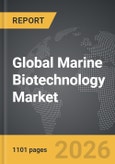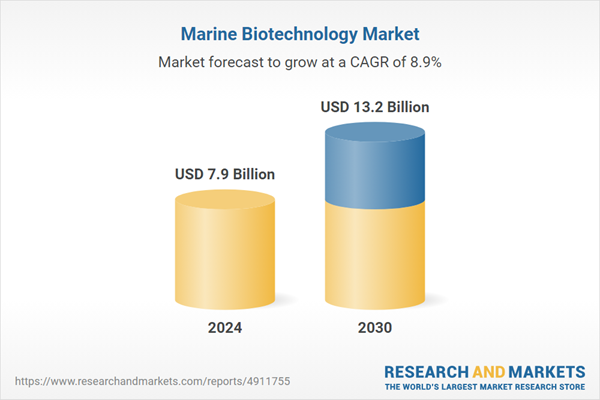Global Marine Biotechnology Market - Key Trends & Drivers Summarized
Marine biotechnology is an innovative and rapidly growing field that leverages the unique properties of marine organisms to develop new products and technologies. This interdisciplinary science harnesses the biological and chemical diversity found in marine environments to create applications in various sectors, including pharmaceuticals, cosmetics, agriculture, and environmental management. Marine organisms, such as algae, sponges, and deep-sea bacteria, produce a wide array of bioactive compounds with potential therapeutic properties. These compounds are being researched for their ability to treat diseases such as cancer, inflammation, and bacterial infections. Additionally, marine biotechnology plays a critical role in the development of sustainable aquaculture practices by providing genetic tools and biotechnological solutions to enhance the growth, health, and resilience of farmed marine species.In the realm of environmental management, marine biotechnology offers innovative solutions for bioremediation and pollution control. Certain marine microorganisms possess the capability to degrade pollutants, such as oil spills and heavy metals, making them valuable for environmental cleanup efforts. The development of bio-based sensors and monitoring systems also allows for real-time tracking of ocean health and water quality, facilitating timely and effective response to environmental hazards. Furthermore, marine biotechnology contributes to the discovery and production of biofuels and bioplastics, promoting the use of renewable resources and reducing reliance on fossil fuels. These advancements not only support environmental sustainability but also drive economic growth by creating new markets and job opportunities in the biotechnology sector.
The growth in the marine biotechnology market is driven by several factors, including advancements in genomics and molecular biology, increasing demand for natural products, and the expanding scope of marine-derived compounds in various industries. Technological progress in DNA sequencing and bioinformatics has significantly enhanced our ability to explore and exploit marine biodiversity, leading to the discovery of novel bioactive molecules and pathways. The rising consumer preference for natural and sustainable products in pharmaceuticals and cosmetics fuels the demand for marine-sourced ingredients. Additionally, the urgent need for sustainable solutions in energy and environmental management propels the development and adoption of marine biotechnology innovations. Government initiatives and funding aimed at promoting marine research and biotechnological applications further support market growth. The confluence of these factors ensures that marine biotechnology will continue to expand, driving both scientific discovery and commercial development in the years to come.
Report Scope
The report analyzes the Marine Biotechnology market, presented in terms of market value (USD). The analysis covers the key segments and geographic regions outlined below.- Segments: Product (Biomaterials, Bioactive Substances, Other Products); Technology (Isolation & Cultivation of Microorganisms, Culture-Independent Techniques); Source (Marine Algae, Marine Fungi, Corals & Sponges, Marine Viruses, Other Sources); End-Use (Pharmaceuticals End-Use, Food End-Use, Cosmetics End-Use, Chemicals End-Use, Other End-Uses).
- Geographic Regions/Countries: World; USA; Canada; Japan; China; Europe; France; Germany; Italy; UK; Spain; Russia; Rest of Europe; Asia-Pacific; Australia; India; South Korea; Rest of Asia-Pacific; Latin America; Rest of World.
Key Insights:
- Market Growth: Understand the significant growth trajectory of the Biomaterials segment, which is expected to reach US$6.7 Billion by 2030 with a CAGR of 9.6%. The Bioactive Substances segment is also set to grow at 8.6% CAGR over the analysis period.
- Regional Analysis: Gain insights into the U.S. market, valued at $2.3 Billion in 2024, and China, forecasted to grow at an impressive 13% CAGR to reach $1.3 Billion by 2030. Discover growth trends in other key regions, including Japan, Canada, Germany, and the Asia-Pacific.
Why You Should Buy This Report:
- Detailed Market Analysis: Access a thorough analysis of the Global Marine Biotechnology Market, covering all major geographic regions and market segments.
- Competitive Insights: Get an overview of the competitive landscape, including the market presence of major players across different geographies.
- Future Trends and Drivers: Understand the key trends and drivers shaping the future of the Global Marine Biotechnology Market.
- Actionable Insights: Benefit from actionable insights that can help you identify new revenue opportunities and make strategic business decisions.
Key Questions Answered:
- How is the Global Marine Biotechnology Market expected to evolve by 2030?
- What are the main drivers and restraints affecting the market?
- Which market segments will grow the most over the forecast period?
- How will market shares for different regions and segments change by 2030?
- Who are the leading players in the market, and what are their prospects?
Report Features:
- Comprehensive Market Data: Independent analysis of annual sales and market forecasts in US$ Million from 2024 to 2030.
- In-Depth Regional Analysis: Detailed insights into key markets, including the U.S., China, Japan, Canada, Europe, Asia-Pacific, Latin America, Middle East, and Africa.
- Company Profiles: Coverage of players such as Aker BioMarine ASA, Aqua Bio Technology ASA, BASF SE, CP Kelco U.S., Inc., Cyanotech Corp. and more.
- Complimentary Updates: Receive free report updates for one year to keep you informed of the latest market developments.
Some of the 215 companies featured in this Marine Biotechnology market report include:
- Aker BioMarine ASA
- Aqua Bio Technology ASA
- BASF SE
- CP Kelco U.S., Inc.
- Cyanotech Corp.
- GlycoMar Ltd.
- Marinova Pty Ltd
- Nutrex Hawaii
- oceanBASIS GmbH
- PharmaMar S.A
- Royal DSM N.V
- SEPPIC
This edition integrates the latest global trade and economic shifts into comprehensive market analysis. Key updates include:
- Tariff and Trade Impact: Insights into global tariff negotiations across 180+ countries, with analysis of supply chain turbulence, sourcing disruptions, and geographic realignment. Special focus on 2025 as a pivotal year for trade tensions, including updated perspectives on the Trump-era tariffs.
- Adjusted Forecasts and Analytics: Revised global and regional market forecasts through 2030, incorporating tariff effects, economic uncertainty, and structural changes in globalization. Includes historical analysis from 2015 to 2023.
- Strategic Market Dynamics: Evaluation of revised market prospects, regional outlooks, and key economic indicators such as population and urbanization trends.
- Innovation & Technology Trends: Latest developments in product and process innovation, emerging technologies, and key industry drivers shaping the competitive landscape.
- Competitive Intelligence: Updated global market share estimates for 2025, competitive positioning of major players (Strong/Active/Niche/Trivial), and refined focus on leading global brands and core players.
- Expert Insight & Commentary: Strategic analysis from economists, trade experts, and domain specialists to contextualize market shifts and identify emerging opportunities.
Table of Contents
Companies Mentioned (Partial List)
A selection of companies mentioned in this report includes, but is not limited to:
- Aker BioMarine ASA
- Aqua Bio Technology ASA
- BASF SE
- CP Kelco U.S., Inc.
- Cyanotech Corp.
- GlycoMar Ltd.
- Marinova Pty Ltd
- Nutrex Hawaii
- oceanBASIS GmbH
- PharmaMar S.A
- Royal DSM N.V
- SEPPIC
Table Information
| Report Attribute | Details |
|---|---|
| No. of Pages | 1101 |
| Published | February 2026 |
| Forecast Period | 2024 - 2030 |
| Estimated Market Value ( USD | $ 7.9 Billion |
| Forecasted Market Value ( USD | $ 13.2 Billion |
| Compound Annual Growth Rate | 8.9% |
| Regions Covered | Global |









